How To Start A Blog Completely Free
The best free blogging platforms in 2021

The best free blogging platforms can give you an online presence that allows you to showcase your work or share your expert knowledge and experience with the world without having to pay for hosting. The most simple blogging options do everything for you, so you can get up and running quickly using ready-made templates, even if you have zero web design or coding skills. Meanwhile, those who are comfortable with web technology can go for more advanced options to customise their blog to for exactly the look and feel they want.
Below we round up the best free blogging platforms available now, from quick and easy template solutions to full online publishing platforms that can do a lot more as well as provide a blogging space (if you think you might want more than a blog in the long term, also see our best website builder guide). If you're unsure about how to get going, see our guide to how to start a blog. Otherwise, read on for quick links to our top three best free blogging platforms or scroll down further for our full selection.
The best free blogging platforms: top 3
The best free blogging platforms in full

01. Wix
The best free blogging platform for beginners
Reasons to buy
+Wide range of templates +Scalable over time
Reasons to avoid
-Free site includes ads -Limited storage on free plan
If you need a quick and easy way to get your blog online without having to learn any web skills in the process, Wix is the best free blogging platform to consider. It offers a drag-and-drop website builder with tons of free templates, including a good number specifically designed for blogs. A free Wix account gives you 500MB of online storage and 1GB of bandwidth, and it's very quick to get set up.
Note that with the free Wix option, you'll have an ad for Wix on your site and a Wix domain name. To remove those and unlock other features like an online store and Google Analytics, you'll need to turn to Wix's paid-for plans, but these are very reasonably priced. You can keep your free website for as long as you wish, but the option to upgrade to cheap paid-for plans makes it easy to scale up if you want to make your blog more professional in the future.
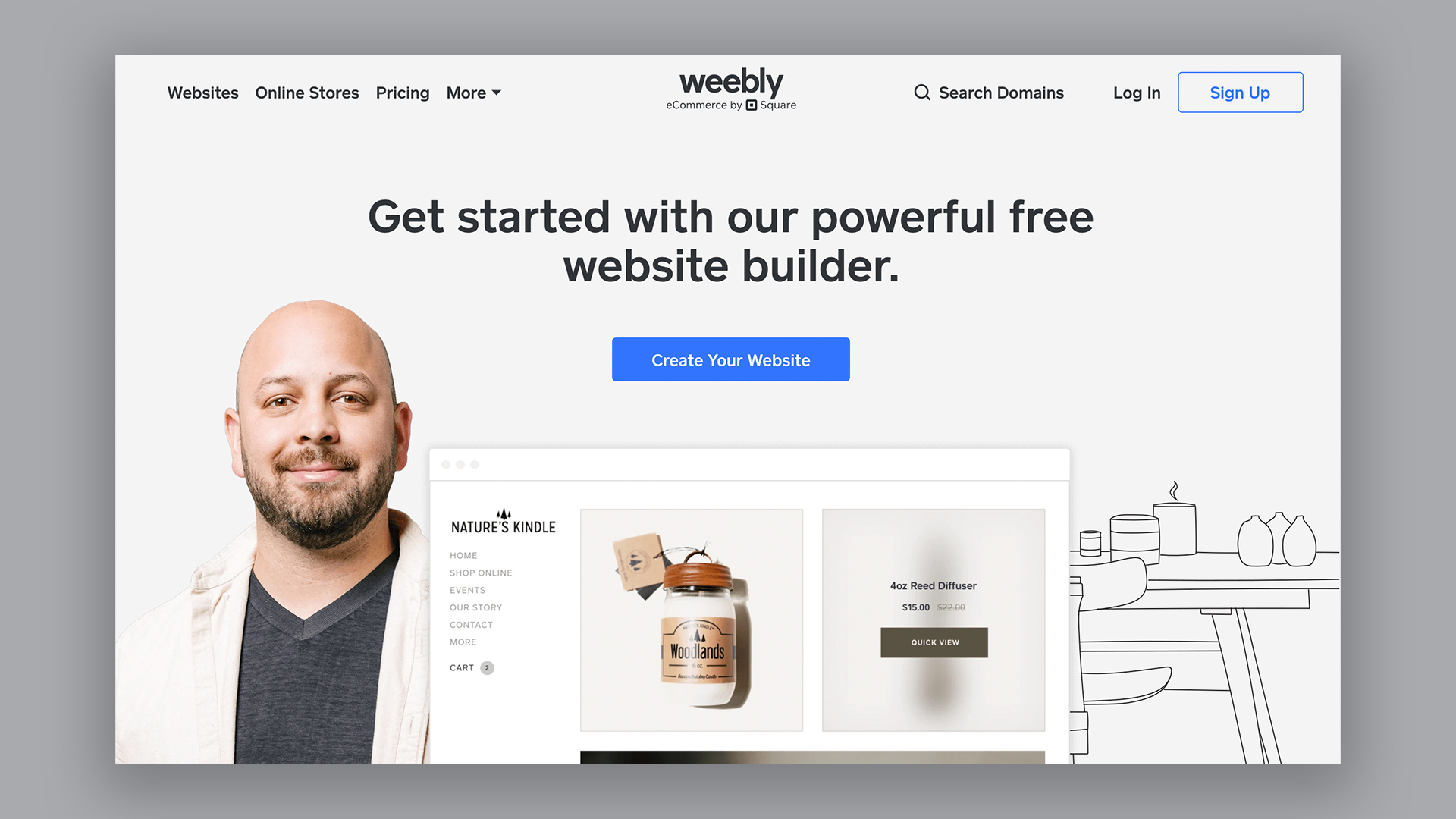
02. Weebly
The second best blogging platform for beginners
Reasons to buy
+Easier to use than Wix +Nice responsive themes
Reasons to avoid
-Not as feature-rich as Wix -Not as customisable as Wix
For an option that's even easier to use than Wix, there's Weebly. The platforms are close rivals and offer fairly similar experiences, but there are some differences. Weebly doesn't have as many customisation features than Wix, but the upside is that if you're new to blogging, you'll find it quicker and easier to get your blog up and running.
Weebly is also based on a drag-and-drop system, which lets you quickly create a website using a template. Like with Wix, the free plan includes a Weebly ad but comes with hosting included. You also get access to customisable layouts, several free themes, and all the social sharing features you need to help send your blog posts far and wide. Again, you can upgrade to a paid plan for more customisation options.
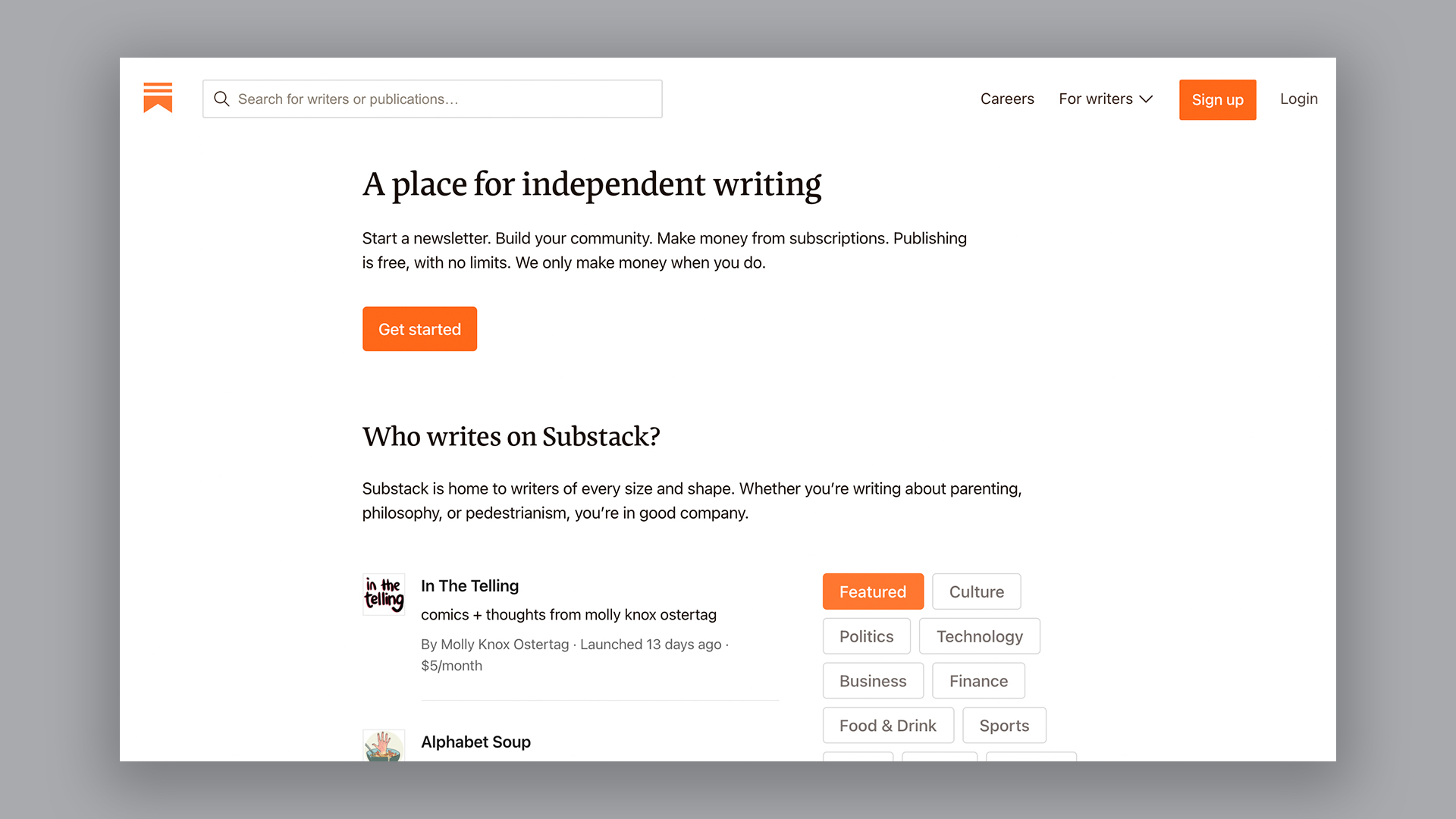
03. Substack
A free blogging platform designed for sending newsletters
Reasons to buy
+Easy to use +Potential to earn money
Reasons to avoid
-Basic layout options
Substack is designed for sending email newsletters rather than for hosting blogs, but it actually works perfectly well as a blog platform too (in fact, many users treat it like one and Substack even describes itself as "the home of great blogging"). Substack offers a free account that comes with web space included. Your newsletters get archived here so anyone can read them and subscribe for further updates, but you can treat this space just as you would a blog.
If you want stunning presentation and snazzy web features, Substack will probably leave you unimpressed since its main focus is on making the written word look good in email format. It does, however, provide a basic CMS with text formatting tools and the ability to embed images, video and other web content to spruce things up a little.
What really makes Substack interesting, though, is that it offers the potential to start earning money from your posts. While you can publish for free, if you start to pick up a following, you may be able to turn that into paid subscriptions. It's not a path that will appeal to everyone, but if you gain an audience and you're prepared to put in the time to build your personal brand, Substack's a straightforward and low-risk way to make that pay.
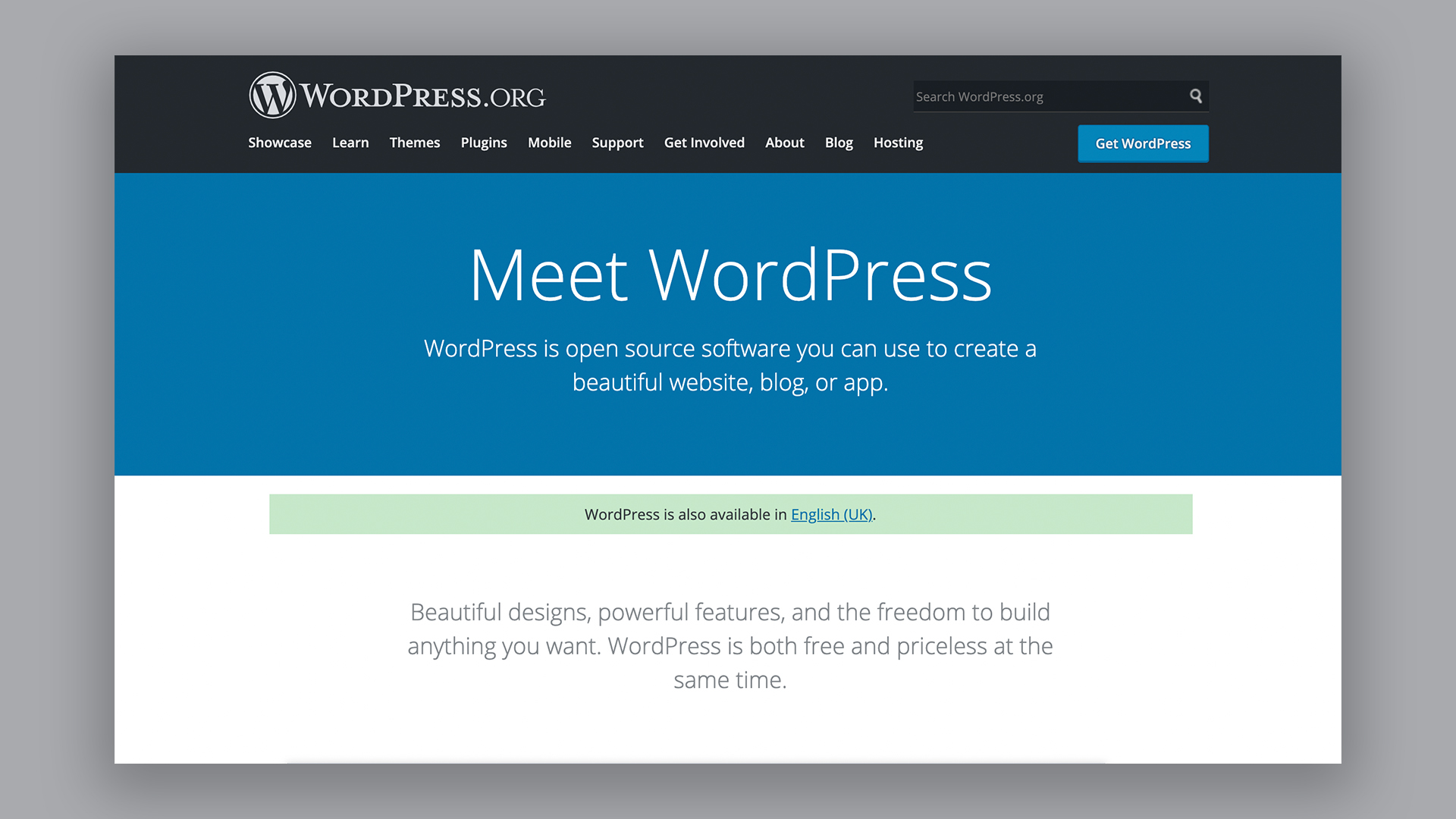
04. WordPress.org
The best blogging platform for finer control over your design
Reasons to buy
+Huge community +Very customisable
Reasons to avoid
-Steep learning curve -Site building takes time
WordPress.org is huge. Launched in 2003, it now powers around a third of the world's websites and it's easily one of the best free blogging platforms in the business (note that this option is not 100 per cent free. The open-source site-building software is free to use, but note that with WordPress you'll need to pay for web hosting and a domain name to get your blog online). The plus side of paying for your own domain and hosting is that any ads that appear on your blog will be ones that you've put there and are making money from.
WordPress.org is incredibly powerful, but it isn't exactly easy if you have no web experience. You'll have to put in some hours if you want to use it effectively because the CMS takes time to get to know and getting the best results usually requires learning at least some web design skills. You can pick up the basics in our article on how to make a website, but you'll also need to acquaint yourself with WordPress's extensive documentation (our guide to the best WordPress tutorials can help).
However, for anyone wanting a great range of customisation and usability, WordPress.org is the gold standard. Check out our guides to the best free WordPress themes and best WordPress plugins. As a final note, make sure you don't confuse WordPress.org with WordPress.com – we'll look at the latter next.
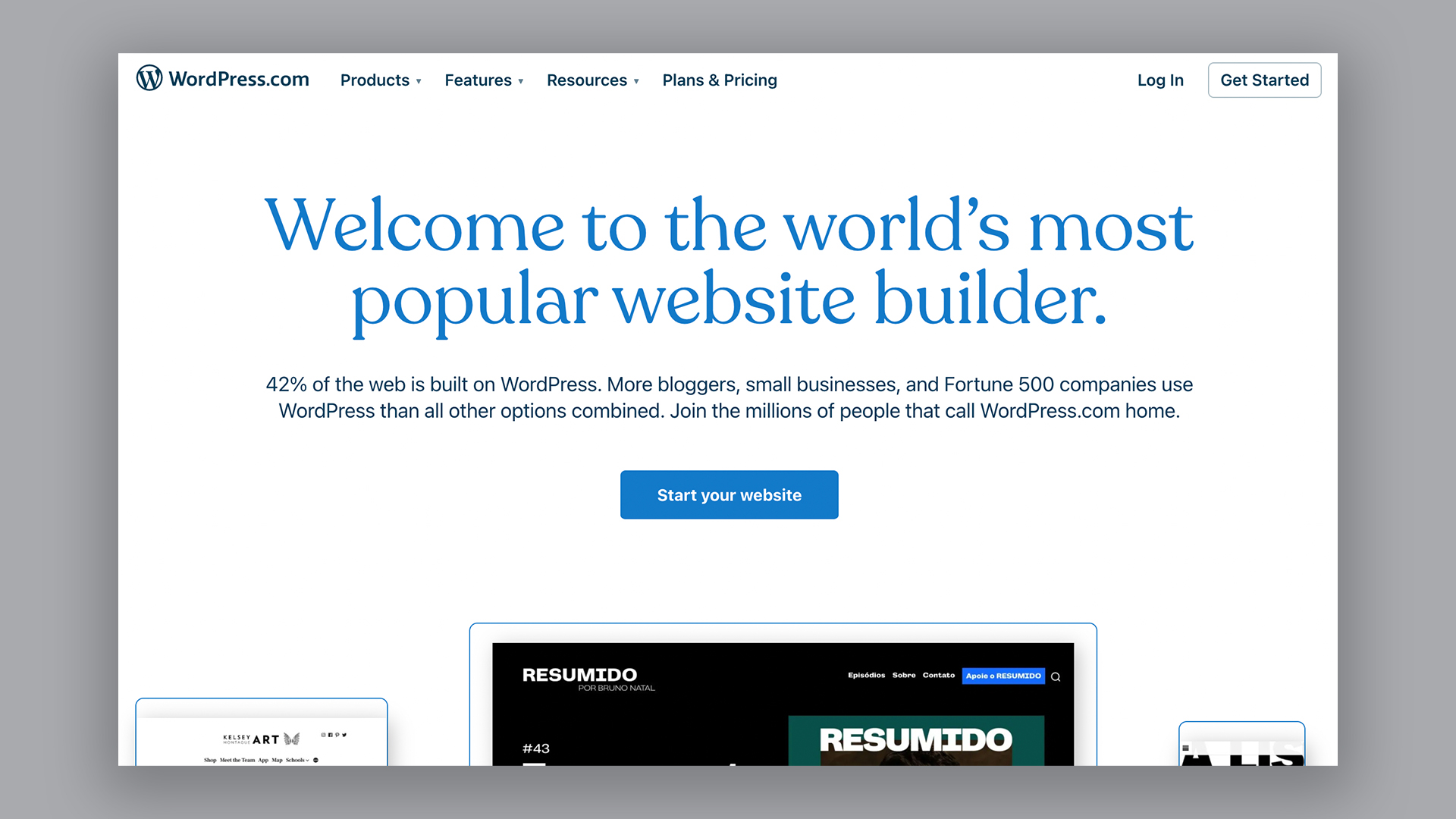
05. WordPress.com
Free blogging platform for hobbyists and enthusiasts
Reasons to buy
+Totally free +Easy to use
Reasons to avoid
-Limited features -Third-party ads
It's easy to get confused here, but WordPress.org (above) and Wordpress.com are two quite different things. The first one, which we've just looked at, offers a powerful web design platform but leaves you having to pay for hosting and a domain name. If you don't want to pay for hosting and all you need is a straightforward website building tool, then in steps WordPress.com, a separate service from the same company.
Aimed more at beginners and hobbyists, Wordpress.com is just the ticket if you're after one of the best free blogging platforms but don't fancy delving into documentation. It's easier to use and offers free hosting, 3GB of space and a branded domain name ending in .wordpress.com.
Just beware that it doesn't give you anywhere near as much ability to customise your site's look and feel as Wordpress.org, and your blog will feature third-party ads that you have no control over. You won't be able to add ecommerce features or place your own ads either. That said, if you're a beginner or casual blogger who just wants to dip their toes and get a site up and running with minimal fuss – and no cost –WordPress.com can be a good option.
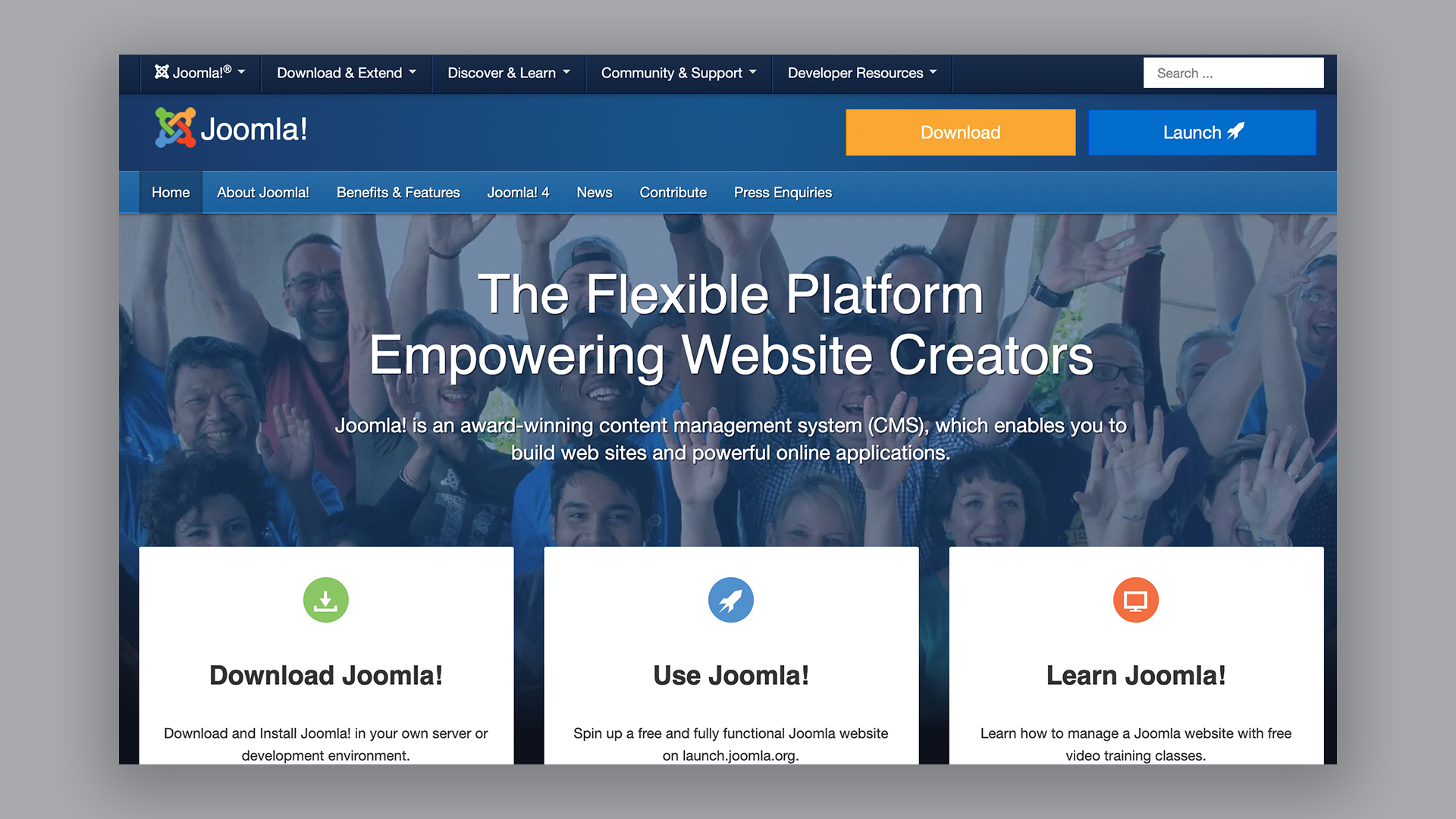
06. Joomla
The best blogging platform for scalability
Reasons to buy
+Open source +Good customisation features
Reasons to avoid
-Not as popular as WordPress -Steep learning curve
Joomla is a versatile, powerful web platform that can be used to create about any sort of website you require, and it's one of the most popular alternatives to WordPress.org. Like the former, it's free and open-source, but again you'll need to pay for a domain name and hosting (although you can create a free site on launch.joomla.org). and you'll need to put in some time to get the best results.
Joomla has hundreds of templates to use and customise, and lots of extensions for adding extra features and getting your blog looking just the way you want it. It doesn't have as many themes and add-ons as WordPress.org, but if you're able to roll up your sleeves and do some of your own coding, you might well find Joomla to be the better bet, especially if you want a larger, more complex site. If you foresee your blog growing into something bigger that you could potentially make money from, this is probably a more scalable solution.
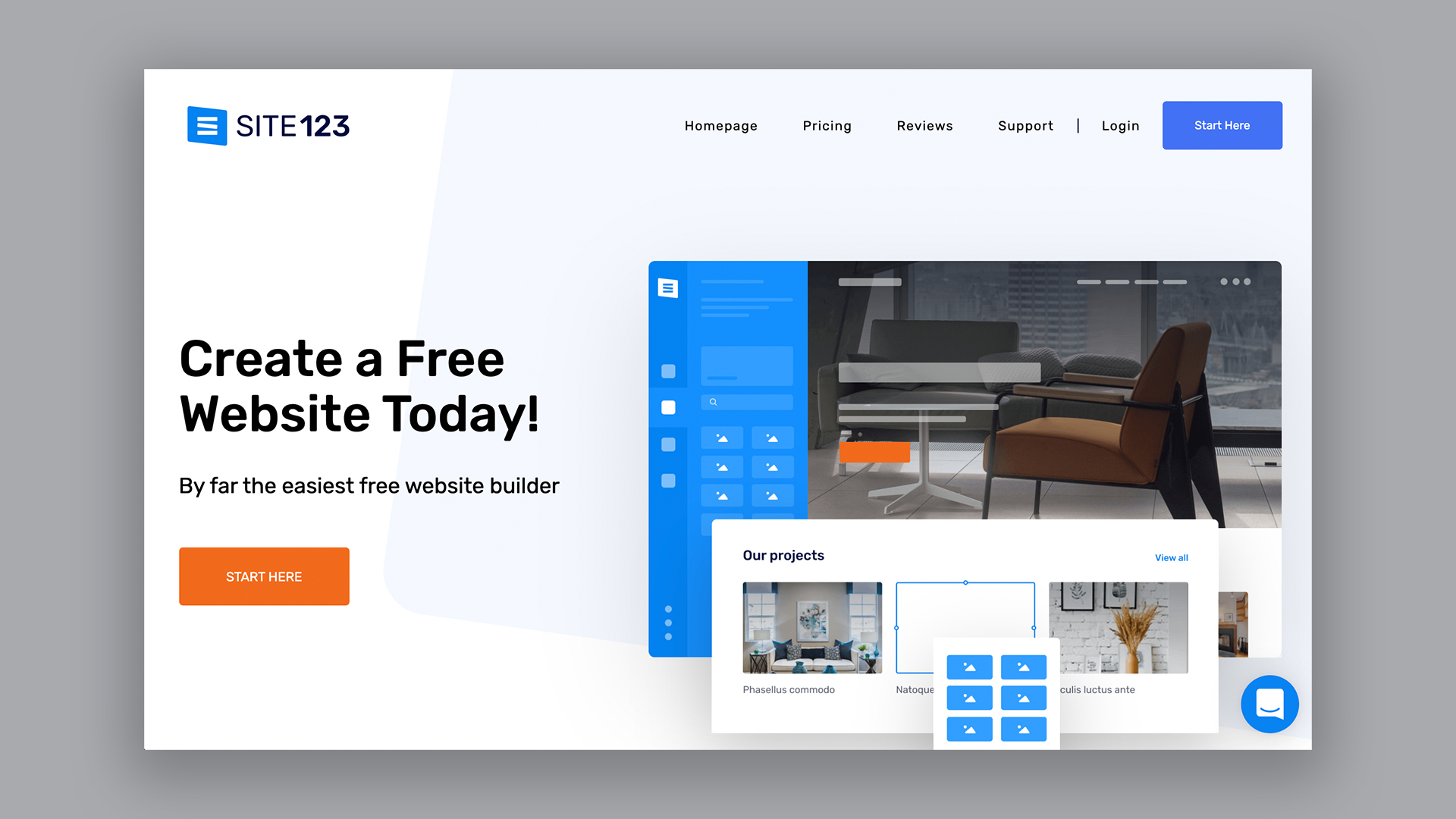
07. Site123
The best blogging platform for nervous newbies
Reasons to buy
+Excellent customer support +Simple and clean templates
Reasons to avoid
-Only good for personal blogs -Limited free storage
Site123 says it's 'by far the easiest free website builder' and it's plain to see why. Getting your blog up and running is incredibly straightforward, and if you need some help along the way, there's a 24/7 live chat feature to help out. The platform provides a selection of ready-made styles and layouts and gives prompts along the way to help you transform them into the site you want.
Don't expect miracles; the results can look a little basic when compared alongside more advanced platforms, but if all you need is a simple blog with comments, post scheduling and social media integration then you get that here. Note that like with most other free blogging platforms, Site123 makes its money by placing ads on your site.
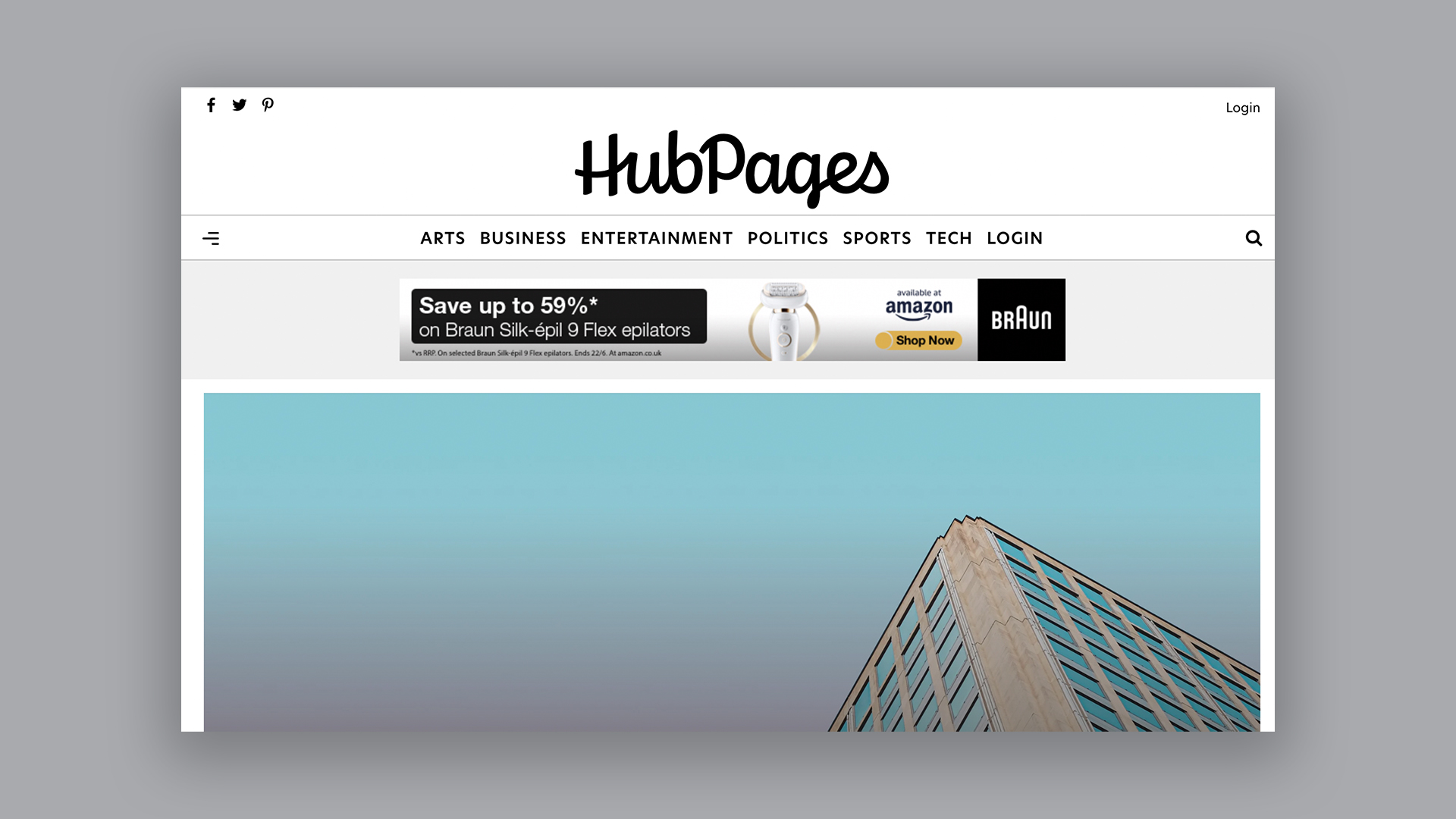
08. Hubpages
Share blog posts with the Hubpages community
Reasons to buy
+Start blogging instantly +Creative focus
Reasons to avoid
-Can't customise look -Don't get a website
Hubpages is another potential solution if you're looking to avoid getting bogged down in code. It's a blogging network with plenty of sections to choose from, including Arts and Design, and it aims to help bloggers connect to a wide audience, share their posts with the community, and even earn some money from advertising and affiliates.
However, with Hubpages, you're tied into the platform's own system and you don't get any control over how your blog looks and feels. On the plus side, ths makes getting started fairly quick and easy. If you're simply interested in expressing yourself online through words rather than through design, it could well be worth investigating.
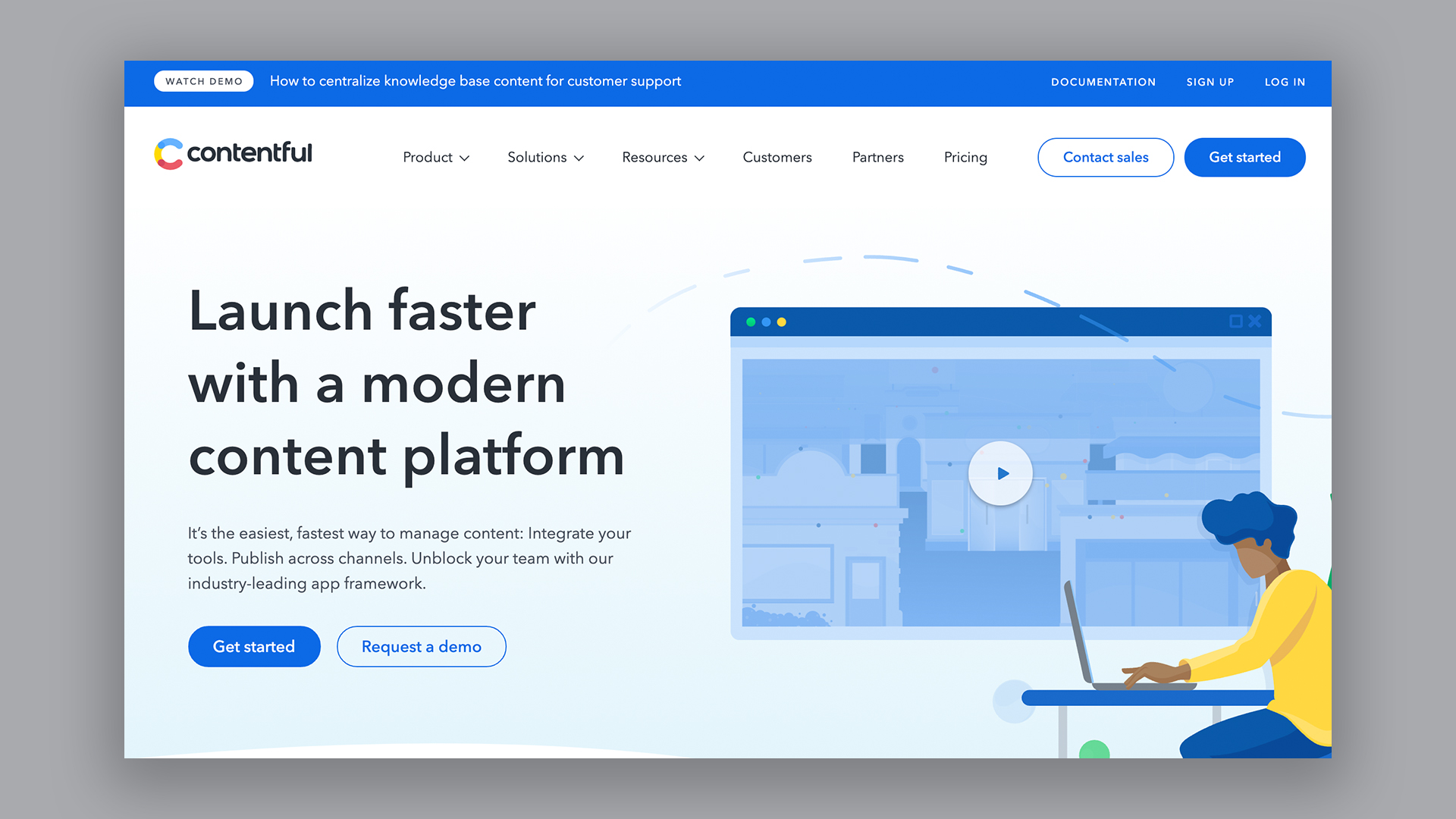
09. Contentful
A unique platform to future-proof your blog content
Reasons to buy
+Separates content from design +Future-proof
Reasons to avoid
-Not great for complex sites -No good for beginners
If you want to ensure your blog keeps up with design trends without having to go back and redesign all your old posts, Contentful is one of the best free blogging platforms to consider. Its unique 'API-first' approach keeps content separate from design. This means that if you decide to give your blog a visual update, the new look will be instantly applied to all your old content. So if, a few years down the line, you decide you want a completely different site, it's easy to bring everything in as it's set up to be portable from the start.
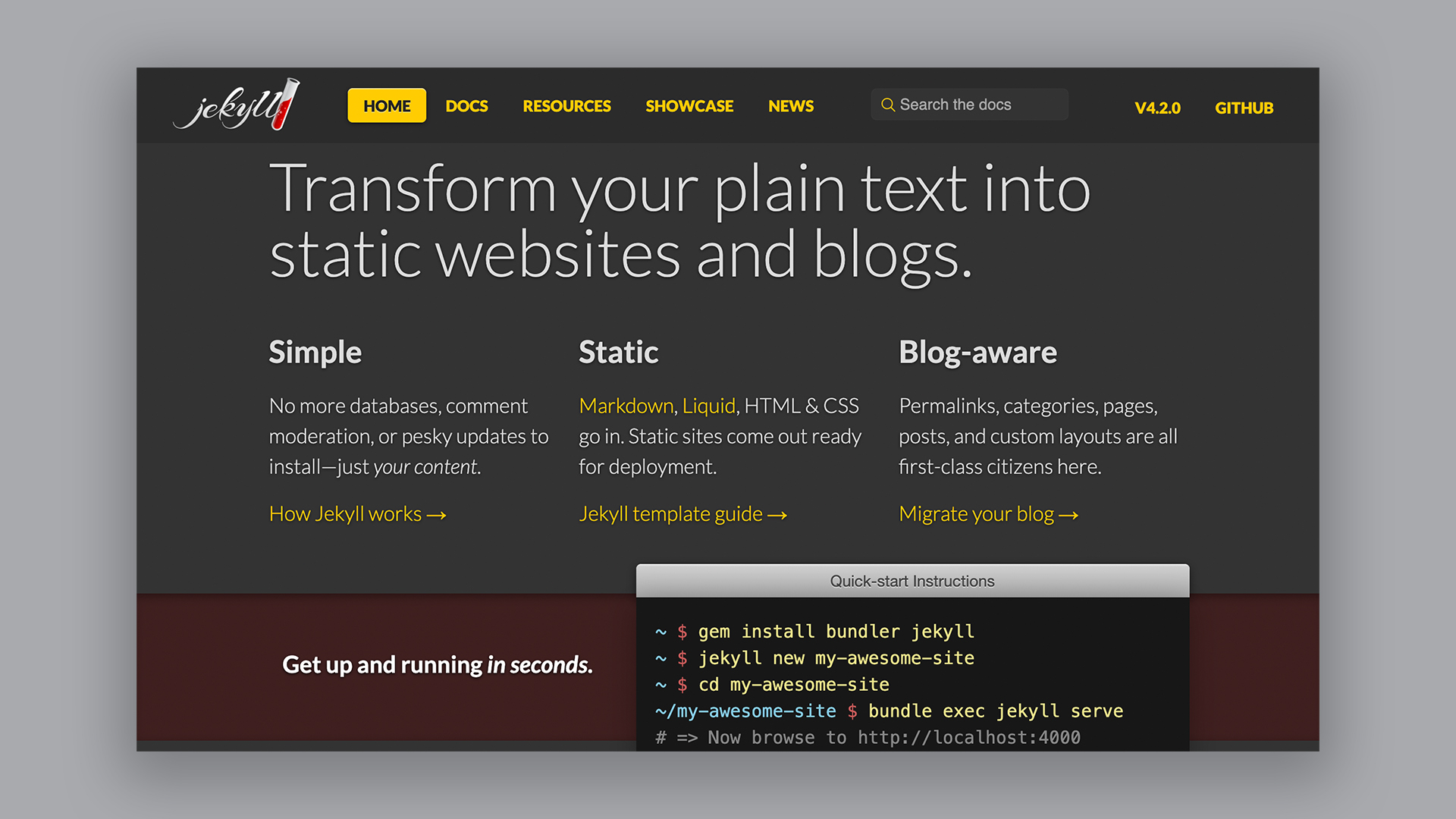
10. Jekyll
The best free blogging platform for developers
Reasons to buy
+Good for prototyping +Free hosting on GitHub pages
Reasons to avoid
-No user-friendly interface -No good for beginners
Not turned off by code? Then you might want to take a look at Jekyll, a blogging platform firmly aimed at developers. Give it some text files with optional markdown and it'll turn them into a static site that you can host anywhere you like. Jekyll is the engine behind GitHub Pages, which means you can host your blog there for free. Making your blog with Jekyll avoids the need to work with technicalities such as databases, upgrades and so on, so there are fewer things to go wrong, and you can build something from scratch.
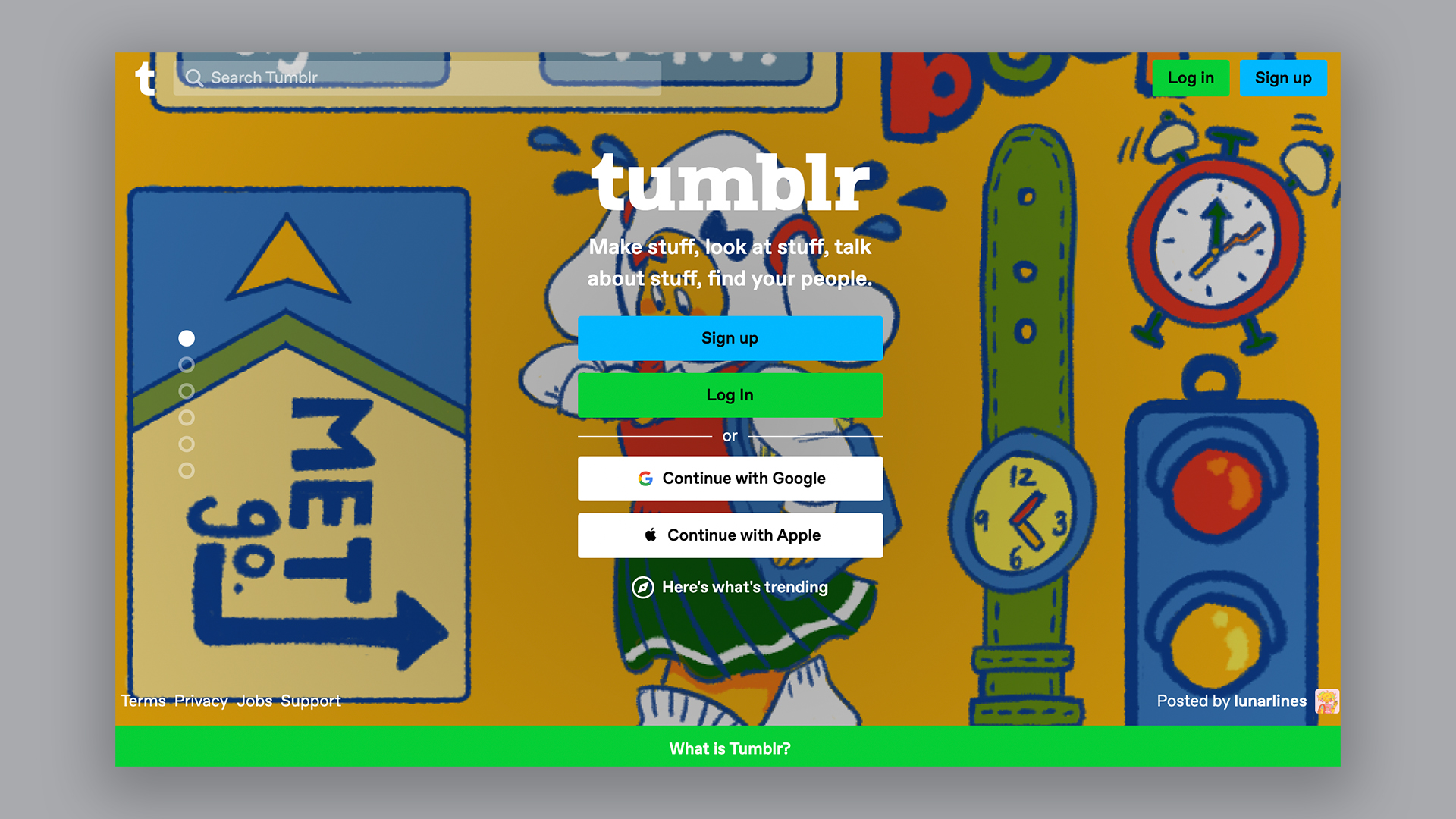
11. Tumblr
An old favourite that's still going
Reasons to buy
+Good for short posts +Easy to use
Reasons to avoid
-Not for 'grown ups' -Difficult to monetise
Tumblr was one of the sharpest looking free blogging platforms when it appeared back in 2007. It may be showing its age now – in fact, you might even have forgotten about it, but it's still one of the best free blogging options around. It offers some great social features, including the ability for users to follow your posts. It's also delightfully straightforward to customise a Tumblr theme to create your own look, and while there aren't exactly a lot of layout options, it's a solid easy platform for long-form blogs or image-based posts. There's also the benefit that you can upload from anywhere thanks to Tumblr's mobile apps.
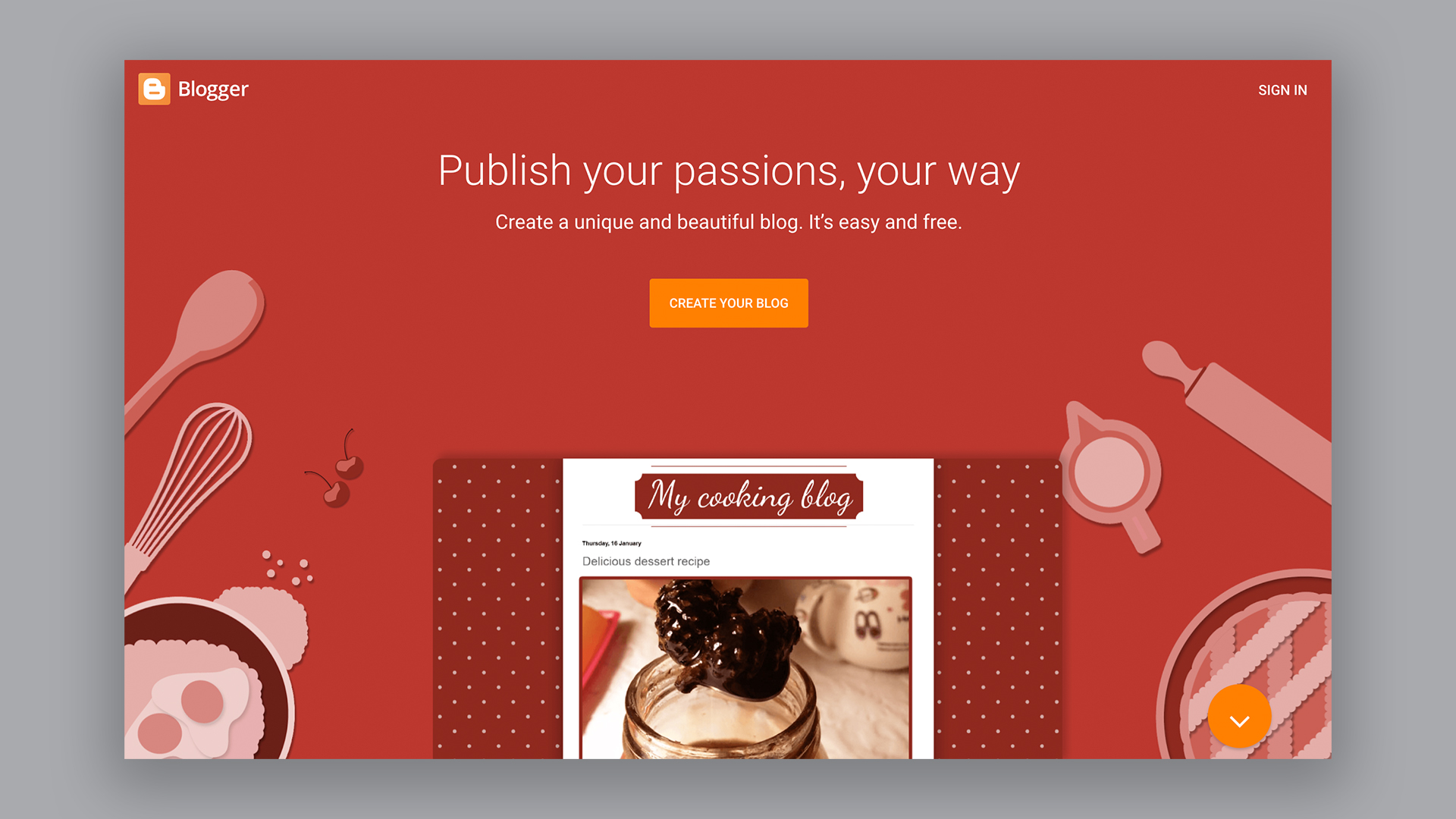
12. Blogger
Google's own veteran blogging platform
Reasons to buy
+Indexed by Google +Integrated with Google Analytics
Reasons to avoid
-Limited features -May be closed in future
Another old favourite, Blogger is ready and waiting for you to sign in if you have a Google ID (and let's face it, we all have a Google ID). Like Tumblr it might bring back memories of what already seems a distant past, but it's still not to be overlooked considering how easy Blogger makes it to get a blog up and running, with plenty of themes to choose from. As long as you're not expecting much in the way of flash design options, this is hard to fault for creating a simple blog.
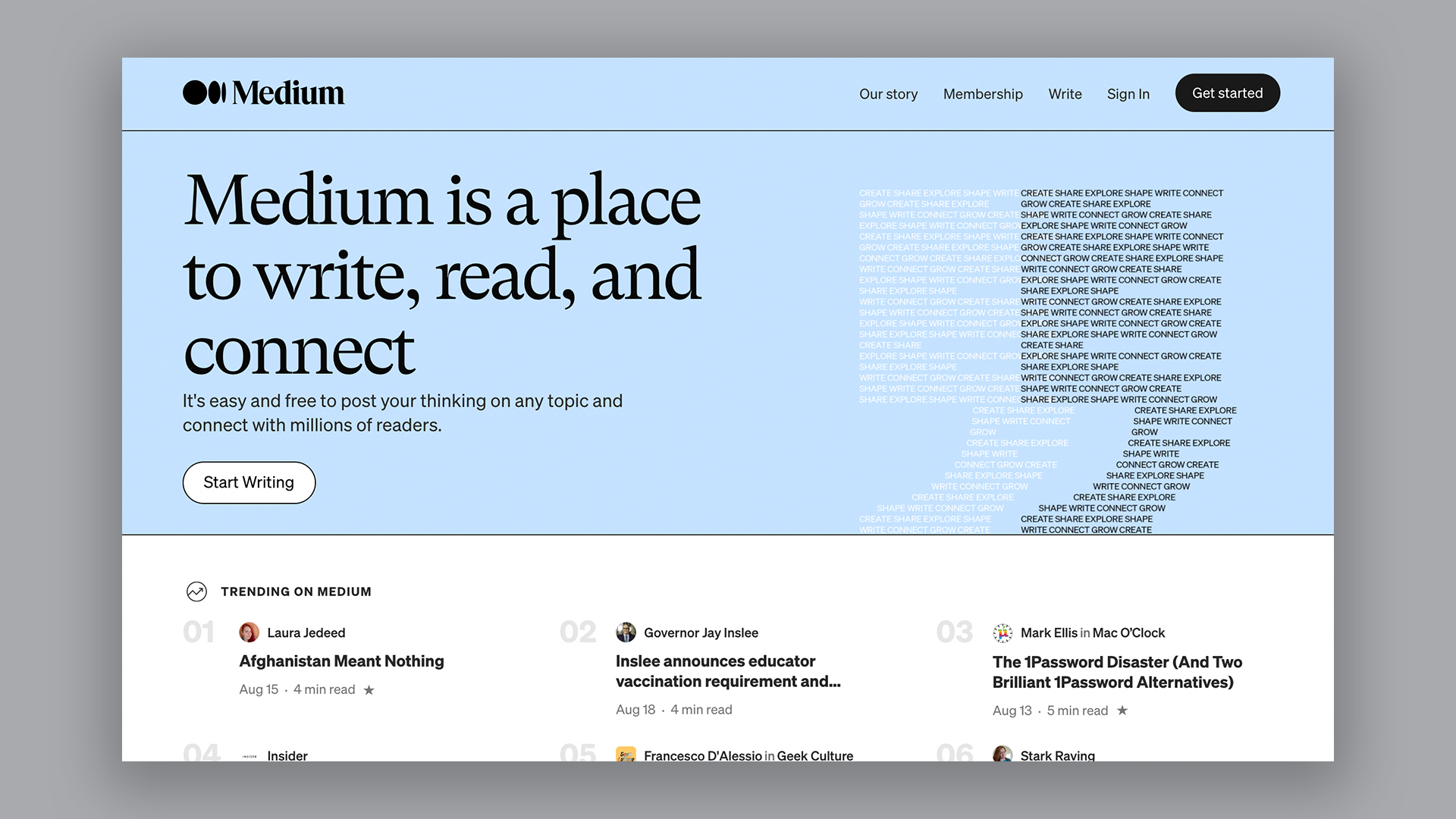
13. Medium
Twitter founders' blogging platform for longform content
Reasons to buy
+No set up required +Respected by professionals
Reasons to avoid
-You don't get a website -Can't customise the look of posts
Many bloggers want their own domain with only their own content, but if you simply want to share your thoughts with the world, that might not be necessary, and a more magazine-like experience might be worth considering. Medium is one of the best free blogging platforms if your main focus is on writing rather than images, and, again, if you're not too concerned about customisation. While you don't have much control over things, the average Medium site looks and feels like clean, well-designed magazine website – one on which anyone can publish their own articles.
It was created by Twitter's founders as a platform for longer articles rather than snappy micro-posts, and while Substack (see number three above) may have taken a bite out of its market, it's still a solid platform for keen scribes and for tech CEOs and other thought leaders who want to share their thoughts. It's a polished, streamlined experience, and a good platform to consider if you want to lend your writing some gravitas.
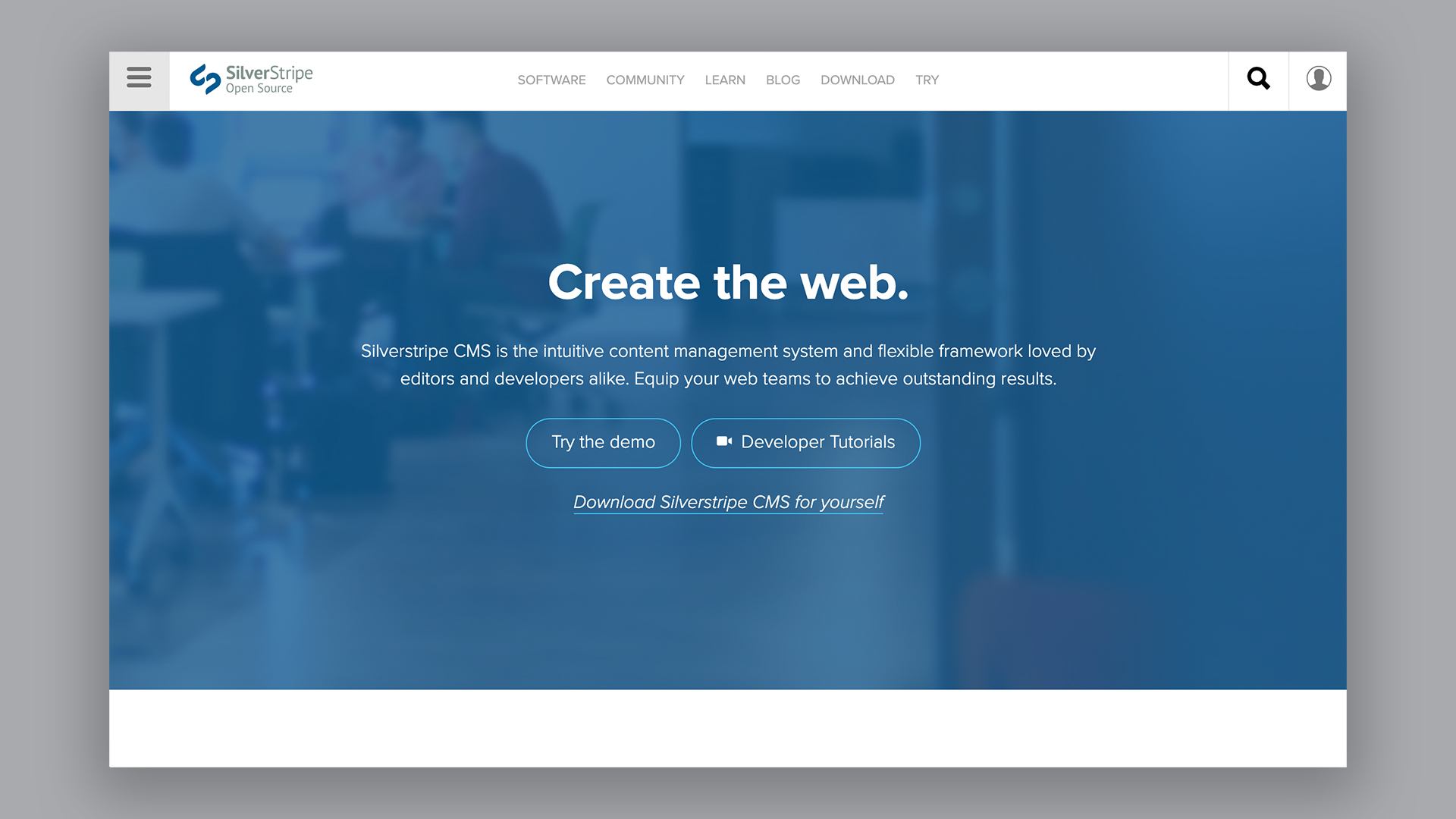
14. SilverStripe
Niche blogging platform for experienced developers
Reasons to buy
+Open source +Strong security
Reasons to avoid
-Small community of users -Better for experienced developers
For experienced developers who prize strong security and powerful features, SilverStripe could be one of the best free blogging platforms to consider. It's a free, open-source CMS that's easy to use once it's set up, but you'll definitely need web skills to get that far. you'll also have to arrange your own domain name and hosting.
Key features include a web-based administration panel, which enables users to make modifications to parts of the website, a WYSIWYG website editor, rich-text editing, quick embedding of videos, and a drag-and-drop, tree-based navigation structure.
Related articles:
- Get the perfect website layout
- Top-class website templates
- Best laptops for graphic design

Tom May is an award-winning journalist and editor specialising in design, photography and technology. He is author of Great TED Talks: Creativity, published by Pavilion Books. He was previously editor of Professional Photography magazine, associate editor at Creative Bloq, and deputy editor at net magazine.
Related articles
How To Start A Blog Completely Free
Source: https://www.creativebloq.com/web-design/best-blogging-platforms-121413634
Posted by: harrisonourch1959.blogspot.com

0 Response to "How To Start A Blog Completely Free"
Post a Comment